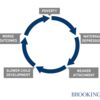0
Report
Community:
Apr 1, 2019
Investments in the postsecondary success of parents with young children can increase attainment of credentials leading to good jobs, bring children the benefits of high-quality learning environments, promote later college-going among children, and improve family economic security across generations. This factsheet provides figures on the student parent population based on the latest National Postsecondary Student Aid Study data.
Authored by: Ascend: The Aspen Institute
Topics: Dual-generation, Early childhood, Post-secondary, Research, Youth
 Shared by Mica O'Brien
Shared by Mica O'Brien
Mica O'Brien posted a
on Apr 11, 2019
Ascend: The Aspen Institute
Investments in the postsecondary success of parents with young children can increase attainment of credentials leading to good jobs, bring children the benefits of high-quality learning environments, promote later college-going among children, and improve family economic security across generations.
0
Report
Community:
Feb 1, 2019
This report looks at school breakfast participation and policies in 76 large school districts across the country to evaluate successful practices in reaching more low-income children with school breakfast. This is a companion report to the School Breakfast Scorecard. Also check out our interactive school breakfast participation map.
Authored by: Food Research & Action Center (FRAC)
Topics: Child welfare, Early childhood, Education, Food insecurity, Low-income, Nutrition
 Shared by Housing Is
Shared by Housing Is
Housing Is posted a
on Mar 1, 2019
Food Research & Action Center (FRAC)
This report looks at school breakfast participation and policies in 76 large school districts across the country to evaluate successful practices in reaching more low-income children with school breakfast. This is a companion report to the School Breakfast Scorecard.
0
Report
Community:
Feb 1, 2019
In the summer of 2018, Ascend gathered more than two dozen state and national policy experts and other leaders in the fields of health and early learning at its Aspen Meadows Campus in Aspen, Colorado, to discuss the growing opportunity to leverage the 2Gen approach at the state level and determine how best to take promising new innovations to scale. This report offers a snapshot of specific things federal, state, and local leaders can keep doing, start doing, or stop doing to remove barriers and accelerate success.
Authored by: Ascend: The Aspen Institute
Topics: Dual-generation, Early childhood, Family engagement, Legislation & Policy, Research
 Shared by Housing Is
Shared by Housing Is
Housing Is posted a
on Feb 15, 2019
Ascend: The Aspen Institute
In the summer of 2018, Ascend gathered more than two dozen state and national policy experts and other leaders in the fields of health and early learning at its Aspen Meadows Campus in Aspen, Colorado, to discuss the growing opportunity to leverage the 2Gen approach at the state level and determine
0
Report
Community:
Jan 31, 2019
For a very young child, the relationship with a primary caregiver, most often though not exclusively a mother, lays an important psychological foundation for later flourishing. Successful attachment and bonding in the first two years of life predicts healthy later development on a range of fronts, from mental health to educational skills. When bonding and attachment prove difficult, child development is affected. Recent advances in brain science allow this impact to be shown more clearly and more definitively.
Authored by: Richard V. Reeves for Brookings Institution
Topics: Child welfare, Depression, Dual-generation, Early childhood, Health, Low-income, Mental health, Mobility
 Shared by Mica O'Brien
Shared by Mica O'Brien
Mica O'Brien posted a
on Feb 5, 2019
Richard V. Reeves for Brookings Institution
For a very young child, the relationship with a primary caregiver, most often though not exclusively a mother, lays an important psychological foundation for later flourishing.
0
Report
Community:
Dec 1, 2018
This 2018 report updates the annual Early Childhood Homelessness State Profiles and provides a snapshot of early childhood data available for children who are experiencing homelessness in each state, plus the District of Columbia and Puerto Rico. It includes publicly available data for 2015—2016 from the U.S. Census Bureau (Census), U.S. Department of Education (ED), U.S. Department of Housing and Urban Development (HUD), U.S. Department of Health and Human Services (HHS), and the Annie E. Casey Foundation.
Authored by: U.S. Department of Education
Topics: Early childhood, Homelessness, Housing, Low-income, Research
 Shared by Mica O'Brien
Shared by Mica O'Brien
Mica O'Brien posted a
on Jan 8, 2019
U.S. Department of Education
This 2018 report updates the annual Early Childhood Homelessness State Profiles and provides a snapshot of early childhood data available for children who are experiencing homelessness in each state, plus the District of Columbia and Puerto Rico.
0
Report
Community:
Oct 17, 2018
Prioritizing young children in Medicaid through cross-sector, innovative practice change has the potential to improve their lifetime trajectories, overall population health and long-run savings.
Authored by: Elisabeth Wright Burak for Georgetown University Health Policy Institute: Center for Children and Families
Topics: Child welfare, Early childhood, Health, Low-income, Medicaid / Medicare, Research
 Shared by Mica O'Brien
Shared by Mica O'Brien
Mica O'Brien posted a
on Dec 13, 2018
Elisabeth Wright Burak for Georgetown University Health Policy Institute: Center for Children and Families
Prioritizing young children in Medicaid through cross-sector, innovative practice change has the potential to improve their lifetime trajectories, overall population health and long-run savings.
0
Report
Community:
Nov 1, 2018
The Colorado Division of Youth Services is working to transform the family experience by taking a two-generation (2Gen) approach to the services it provides.
Authored by: Tony Gheradini for Ascend: The Aspen Institute
Topics: Child welfare, Dual-generation, Early childhood, Family engagement, Low-income, Partnerships, Stability
 Shared by Mica O'Brien
Shared by Mica O'Brien
Mica O'Brien posted a
on Dec 13, 2018
Tony Gheradini for Ascend: The Aspen Institute
The Colorado Division of Youth Services is working to transform the family experience by taking a two-generation (2Gen) approach to the services it provides.
0
Report
Community:
Oct 24, 2018
CLPHA’s Housing Is Initiative is engaged in a number of cross-sector activities focused on developing partnerships, facilitating a community of practice, resource development, promoting best practices, online collaboration, policy and advocacy, and training and education. Read about recent activities in this Fall Update.
Authored by:
Topics: Child welfare, CLPHA, Community development, Cost effectiveness, Data sharing, Early childhood, Education, Family engagement, Funding, Health, Homelessness, Housing, Low-income, Medicaid / Medicare, Mental health, Partnerships, Place-based, Post-secondary, Research, Stability, Substance abuse, Workforce development, Youth
 Shared by Mica O'Brien
Shared by Mica O'Brien
Mica O'Brien posted a
on Oct 24, 2018
CLPHA’s Housing Is Initiative is engaged in a number of cross-sector activities focused on developing partnerships, facilitating a community of practice, resource development, promoting best practices, online collaboration, policy and advocacy, and training and education.
0
Report
Community:
Aug 13, 2018
Maternal depression is a widespread public health concern that has been linked to negative impacts on child development and health outcomes. Within home visiting programs serving low-income women, maternal depression rates have been measured as high as 61 percent. Home visitors are uniquely positioned to help address maternal depression and can play an important role in conducting screenings and providing referrals to community resources. This brief summarizes the existing research to illustrate the importance of addressing maternal depression in home visiting programs, and outlines three promising approaches.
Authored by: Rebecca Peters and Devon Genua for Urban Institute
Topics: Early childhood, Health, Homelessness, Low-income, Mental health
 Shared by Mica O'Brien
Shared by Mica O'Brien
Mica O'Brien posted a
on Sep 18, 2018
Rebecca Peters and Devon Genua for Urban Institute
Maternal depression is a widespread public health concern that has been linked to negative impacts on child development and health outcomes. Within home visiting programs serving low-income women, maternal depression rates have been measured as high as 61 percent.
0
Podcast
Community:
Aug 15, 2018
Evidence shows that investing in children today can decrease poverty for the next generation of adults. Host Justin Milner speaks with researchers Heather Hahn and Cary Lou about the federal government’s current spending on kids, future projections for this spending, and what that means for America’s children.
Authored by: Urban Institute
Topics: Child welfare, Early childhood, Education, Funding, Legislation & Policy, Research, Youth
 Shared by Mica O'Brien
Shared by Mica O'Brien
Mica O'Brien posted a
on Sep 18, 2018
Evidence shows that investing in children today can decrease poverty for the next generation of adults.
0
Report
Community:
Jul 19, 2018
As prospects seem to diminish for the next generation being
better off than the current one, it is essential to elevate the
successful work being done to address intergenerational
poverty and create an intergenerational path of opportunity.
Practical State Solutions profiles effective solutions from Ascend
partners throughout the United States and the work driven by
leaders in Colorado, Connecticut, Florida, Georgia, Maryland,
Minnesota, Tennessee, and Utah. It contains recommendations
on processes that lead to better outcomes for families, lessons
learned on engaging and bringing families to the table as
empowered experts, and information on how to move to
the next level whether you are starting your 2Gen journey or
working to go deeper.
Authored by:
Topics: Asset building, Child welfare, Criminal justice, Dual-generation, Early childhood, Family engagement, Funding, Health, Legislation & Policy, Post-secondary, Workforce development
 Shared by Housing Is
Shared by Housing Is
Housing Is posted a
on Jul 19, 2018
As prospects seem to diminish for the next generation being
better off than the current one, it is essential to elevate the
successful work being done to address intergenerational
poverty and create an intergenerational path of opportunity.
Practical State Solutions profiles effective solutions from
0
Report
Community:
Jul 12, 2018
We examined the influence of maternal health literacy on child participation in social welfare programs. In this cohort, 20% of the mothers had inadequate or marginal health literacy. Initially, more than 50% of the families participated in Temporary Assistance for Needy Families (TANF), the Food Stamp Program, and Special Supplemental Nutrition Program for Women, Infants, and Children, whereas fewer than 15% received child care subsidies or public housing. In multivariate regression, TANF participation was more than twice as common among children whose mothers had adequate health literacy compared with children whose mothers had inadequate health literacy
Authored by:
Topics: Child welfare, Dual-generation, Early childhood, Education, Family engagement, Food insecurity, Health, Housing, Low-income, Medicaid / Medicare, Nutrition, Pre-natal, Preventative care, Research, Stability
 Shared by Housing Is
Shared by Housing Is
Housing Is posted a
on Jul 12, 2018
We examined the influence of maternal health literacy on child participation in social welfare programs. In this cohort, 20% of the mothers had inadequate or marginal health literacy.
0
Report
Community:
Jul 11, 2018
To help inform policymakers and move policy forward, this paper discusses the current state of housing in the United States, provides a conceptual framework for housing as a platform to improve educational outcomes for children, reviews the existing evidence that supports conceptual models, and identifies the major gaps in research. Finally, it proposes a list of projects that make up a research agenda for understanding the issue and guiding investments in new research.
Authored by:
Topics: Attendance, Child welfare, Early childhood, Education, Housing, Literacy, Low-income, Mental health, Post-secondary, Preventative care, Racial inequalities, Research, Safety, Stability, Youth
 Shared by Housing Is
Shared by Housing Is
Housing Is posted a
on Jul 11, 2018
To help inform policymakers and move policy forward, this paper discusses the current state of housing in the United States, provides a conceptual framework for housing as a platform to improve educational outcomes for children, reviews the existing evidence that supports conceptual models, and iden
0
Report
Community:
Mar 6, 2018
MDRC, a nonprofit, nonpartisan education and social policy research firm, released encouraging results from a demonstration, funded by Robin Hood, of two aligned interventions in New York City.
Authored by: MDRC
Topics: Early childhood, Education, Grade-level proficiency, Low-income, Metrics, Racial inequalities, Research, Youth
 Shared by Housing Is
Shared by Housing Is
Housing Is posted a
on Jul 5, 2018
MDRC, a nonprofit, nonpartisan education and social policy research firm, released encouraging results from a demonstration, funded by Robin Hood, of two aligned interventions in New York City.
1
Report
Community:
May 1, 2017
State by State Chart
Authored by: ACF
Topics: Early childhood
 Shared by Marsha Basloe
Shared by Marsha Basloe
Marsha Basloe posted a
on May 4, 2017
 Shared by Housing Is
on Mar 1, 2019
Shared by Housing Is
on Mar 1, 2019
 Shared by Housing Is
on Feb 15, 2019
Shared by Housing Is
on Feb 15, 2019




 Shared by Housing Is
on Jul 19, 2018
Shared by Housing Is
on Jul 19, 2018
 Shared by Housing Is
on Jul 12, 2018
Shared by Housing Is
on Jul 12, 2018
 Shared by Housing Is
on Jul 11, 2018
Shared by Housing Is
on Jul 11, 2018
 Shared by Housing Is
on Jul 5, 2018
Shared by Housing Is
on Jul 5, 2018
 Shared by Marsha Basloe
on May 4, 2017
Shared by Marsha Basloe
on May 4, 2017







